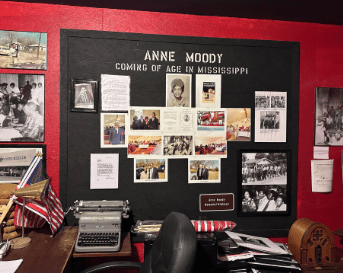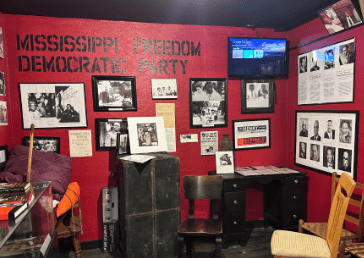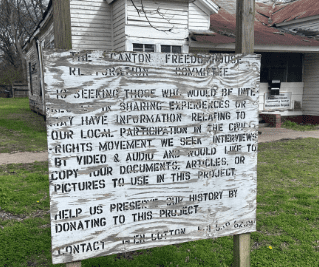This article first appeared on the Magnolia Tribune.
- In 2019, Mississippi’s few remaining freedom houses were listed as one of the state’s most endangered historic places.
During the height of the Civil Rights movement, supporters of the movement flooded into Mississippi. These people needed a place of refuge, a place to rest their heads, worship, and recharge. For many, these Freedom Homes were their safe space, their only place for peace in otherwise dangerous and volatile situations.
Mississippi freedom houses were kept relatively secret to keep Civil Rights activists safe. Because of this, many of the freedom houses are no longer standing and are seemingly forgotten over time. In 2019, Mississippi’s few remaining freedom houses were listed as one of the state’s most endangered historic places.
Freedom House Canton Museum
One of these few still-standing homes has been memorialized in Canton. The Canton Freedom House Museum on George Washington Avenue is maintained by Glen Cotton – a descendant of George Washington – a Cantonian who was pivotal during the Civil Rights Movement as the owner of the Freedom House. Cotton has made a few changes to the home, aside from adding a room for viewing a video within the museum. Walking through the front door of the house transports you from Canton 2024 to 1960’s Canton.

This three-room house would hold up to 10 people overnight at a time, with folks sleeping on beds, chairs, and sleeping bags on the hardwood floor. All of the overnight guests shared one outhouse-style bathroom. The museum has the “overnight pots” on display, along with the original thin sleeping bags that lined the floor.
This freedom house was more than a sleeping space. It was a meeting place, a place of worship, of business, of fellowship, hiding, organizing, and battling for racial equality.
Dr. William Truly is the mayor of Canton and is featured in the welcome video for the museum. He called the Freedom House Museum a memorial of the original function of the house.
“Freedom House was a place to train you how to protect your head,” said Dr. Truly. “Meaning protect your head from violence. Your life from harm. Freedom House is preserving our history, for then, now, and those yet unborn who will face inequality.”

The Freedom House Canton, like many other freedom houses across Mississippi, served as a sanctuary for Freedom Riders coming into Canton in the 1960s. The home opened by George Washington served as a bridge for many of the larger names of the Civil Rights Movement—Anne Moody, Medgar Evers, Martin Luther King Jr., and more— to have a base of operations.
Canton: the 60s and Beyond
There’s more history outside the walls of the Freedom House Museum. Just across the street were project homes, now apartments, where Martin Luther King Jr would visit with his grandparents. Further down George Washington Avenue, around the corner, stands McNeal Elementary on Martin Luther King Drive. This modern school was once a collection of shacks serving as schoolhouses.

McNeal Elementary was a scheduled stop for James Merideth during the March Against Fear in Canton in 1966. Upon the marchers arriving at the school, local law enforcement was dispatched and tear-gassed the demonstrators. Martin Luther King Jr. was also in attendance—and kept those who were tear-gassed in peace, ensuring law enforcement there would be no violence in their demonstration.
Driving down George Washington Avenue and Martin Luther King Drive, you almost forget what year it is. Many of the houses have had little to no upgrades. The history there is evident, though not entirely preserved.
“There are a lot of places here that many people don’t even know what the history is,” said Alderman Timothy Taylor. “We’ve tried to get some markers (historic landmark markers) out here in the past, but we were told they were around $16,000. I think that’s changed, so we’re in the works.”
Dr. Truly said that Canton is now a place of freedom.
“We’ve come a long way from then,” said Dr. Truly on the video. “We can try on clothes, we can buy a hamburger, and we can ride a bus (without being segregated).”
Dr. Truly said the large push for voter registration for African Americans in Canton is what brought Canton to where it is today.
“We elected our first black mayor in 1994, and we’ve had black mayors since then,” said Dr. Truly. “People had to fight for it, risk real harm, to vote.”
The Freedom House Canton Museum is open weekdays from 9 am to 4 pm and Saturday by appointment only. Visit FreedomHouseCanton.org or call (601) 317-2557 for more information.
This article first appeared on the Magnolia Tribune and is republished here under a Creative Commons license.
Read original article by clicking here.

